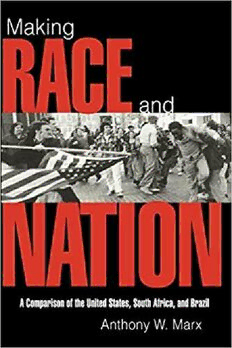
Making Race and Nation: A Comparison of South Africa, the United States, and Brazil PDF
Preview Making Race and Nation: A Comparison of South Africa, the United States, and Brazil
Whyand howhas race become a central aspectofpolitics duringthis century? This book addresses this pressing question by comparing apartheid and resistance to it in South Africa, theJim Crow laws and protests against them in the United States, and the myth of racial democracy in Brazil. Anthony Marx argues that these divergent ex— periences had roots in the history of slavery, colonialism, miscege— nation, and culture, but were fundamentally shaped by efforts and elite bargains to build national unity. In South Africa and the United States, ethnic or regional conflicts among whites were gradually re— solvedbyunifyingwhites as a race and excludingblacks,whileBrazil’s longer—established national unityrequired no such legalracistcrutch. Race was thus central to projects ofnation building, and nationalism shaped uses ofrace. Professor Marx extends this argumentto explain popular protest and the current salience ofissues ofrace, and to sug— gesthowbuildingnationalunityalsobuildsuponandreinforcessocial divisions more generally. Making Race and Nation Cambridge Studies in Comparative Poliltics GeneralEditor PeterLange, Duke University AssociateEditors RobertH. Bates, Harvard University Ellen Comisso, UniversityofCalifornia, San Diego PeterHall, Harvard University JoelMigdal, UniversityofWashington HelenMilner, Columbia University Ronald Rogowski, UniversityofCalifornia, LosAngeles SidneyTarrow, Camel] University OtherBooksin the Series Catherine Boone,MerchantCapitalandthe RootsofStatePowerin Senegal, 1930— 1985 Michael Bratton andNicolasvan de Walle, DemocraticExperimentsinAfrica: Regime Transitionsin ComparativePerspective Donatella dellaPorta, SocialMovements, Political Violence, andthe State Roberto Franzosi, The Puzzle ofStrikes: ClassandStateStrategiesin PostwarItaly GeoffreyGarrett, PartisanPoliticsin the GlohalEconomy Nliriam Golden, HeroicDefeats: The Politicsofj’oh Loss FrancesHago ian, TraditionalPoliticsandRegime ChangeinBrazil J. Rogers Ho ' gsworthand Robert Boyer, Contemporary Capitalism: The EmheddednessofInstitutions EllenImmergut,HealthPolitics:InterestsandInstitutionsin WesternEurope ThomasJanoski andAlexanderM. Hicks, eds., The ComparativePolitical Economyofthe Welfare State RobertO. Keohane and Helen B. Milner, eds., InternationalizationandDomestic Politics David Knoke, FranzUrban Pappi,JeffreyBroadbent, andYutakaTsujinaka, eds., ComparingPolicyNetworks Allan Kornbergand Harold D. Clarke, CitizensandCommunity:PoliticalSupport inaRepresentativeDemocracy David D. Laidn, Lan geRepertoriesandState ConstructioninAfrica MarkIrvingLichbacé—Ijiand Alan S. Zuckerman, eds., ComparativePolitics: Rationality, Culture, andStructure DougMcAdam,JohnMcCarthy, and Mayer Zald, eds., ComparativePerspectives on SocialMovements ScottMainwaringandMatthew Soberg Shugart, PresidentialismandDemocracy in LatinAmerica Joel S. Migdal, Atul Kohli, and Vivienne Shue, eds., StatePowerandSocial .Forces:DominationandTransformation in the Third World Paul Pierson, Dismantlingthe Welfare State?: Reagan, ThatcherandthePoliticsof Retrenchment Marino Regini, Uncertain Boundaries: The SocialandPoliticalConstructionof EuropeanEconomies Yossi Shain andJuan Linz, Interim GovernmentsandDemocraticTransitions Theda Skocpol, SocialRevolutionsin theModern World David Starkand Laszlé Bruszt, PostsocialPathways: TransformingPoliticsand Propertyin East CentralEurope Sven Steinmo, KathleenThelan, and FrankLongstreth, eds., StructuringPolitics: HistoricalInstitutionalismin ComparativeAnalysis SidneyTarrow, PowerinMovement: SocialProtest, Rq’orm, andRevolution AshutoshVarshney, Democracy, Development, andthe Countryside Making Race and Nation A COMPARISON OF SOUTH AFRICA, THE UNITED STATES, AND BRAZIL ANTHONY W. MARX Columbia University CAMBRIDGE UNIVERSITYPRESS CAMBRIDGEUNIVERSITYPRESS Cambridge,NewYork,Melbourne,Madrid,CapeTown,Singapore,SfioPaulo CambridgeUniversityPress 32AvenueoftheAmericas,NewYork,NY 10013-2473,USA www.cambridge.org Informationonthistitle:www.cambridge.org/9780521584555 ©AnthonyW.Marx1998 Thispublicationisincopyright.Subjecttostatutoryexception andtotheprovisionsofrelevantcollectivelicensingagreements, noreproductionofanypartmaytakeplacewithoutthewritten permissionofCambridgeUniversityPress. Firstpublished 1998 Firstpaperbackedition 1998 9thprinting2006 AcatalogrecordforthispublicationisavailablefromtheBritishLibrary. ISBN978-0-521-58455-5hardback ISBN978-0-521-58590-3paperback Transferredtodigitalprinting2007 CambridgeUniversityPresshasnoresponsibilityforthepersistenceor accuracyofURLsforexternalorthird-partyInternetwebsitesreferredtoin thispublication,anddoesnotguaranteethatanycontentonsuchwebsitesis, orwillremain,accurateorappropriate. For Karen Contents Preface andAcknowledgments page xi 1 Introduction 1 Bounding the State and InstitutionalizingIdentities 3 Comparing and Excavating Historical Foundations 6 Constructing Racial Domination 10 Challenging the Racial Order 17 What Is at Stake? 23 Part One: Historicaland Cultural Legacies 27 2 Trajectoriesfi'om Colonialism 29 Portuguese Brazil 29 Dutch and British Colonial Legacies 35 Comparative Overview 43 3 Lessonsfrom Slavery 47 The Myth ofBrazil’s “Humanitarian” Slavery 48 Slavery and Abolitionism in the United States 56 Comparing Slavery and Its Implications 62 4 The Uncertain Legacy ofMiscegenation 65 Implications 77 Part Two: RacialDomination and the Nation-State 81 5 “Wefor Thee, South Africa”: The Racial State 84 White Conflict, Forced Unity, and Black Exclusion 84 Ethnic Political Competition and Segregation 94 CONTENTS Apartheid and Greater White Unity 104 6 “To Bind Up the Nation’s Wounds”: The United States after the Civil War 120 The Nation Divided 120 Segregation, Party Competition, and Nation—State Consolidation 131 Centralizing Power and Greater White Unity 145 7 “Orderand Progress”: Inclusive Nation—State Building in Brazil 158 Unity and Discrimination 159 The PersistentMyth ofRacial Democracy 164 Comparative Racial Domination: An Overview 178 Part Three: Race Makingfrom Below 191 8 “We Are a Rock”: Black RacialIdentity, Mobilization, and the New South Africa 194 Consolidation ofRacial Identity and Protest 194 Black Protest Forces Inclusive Nation—State Building 204 9 Buryingj’im Crow: Black RacialIdentity, Mobilization, and Reform in the United States 217 Toward Racial Solidarity 217 Rising Black Protest Forces State Reforms 224 National Black Protest and White Backlash 234 The Movement Fractures 245 10 Breathing Brazil’s Pact ofSilence 250 Constrained Afro—Brazilian Solidarityunder Racial Democracy 251 Afro—Brazilian Activism Emerges 255 Comparative Overview 264 11 Conclusion 267 Unmaking Legal Racial Domination and the Continuing Legacies ofDiscrimination 269 CONTENTS General Implications 274 Notes 279 Bibliography 351 Index 381
